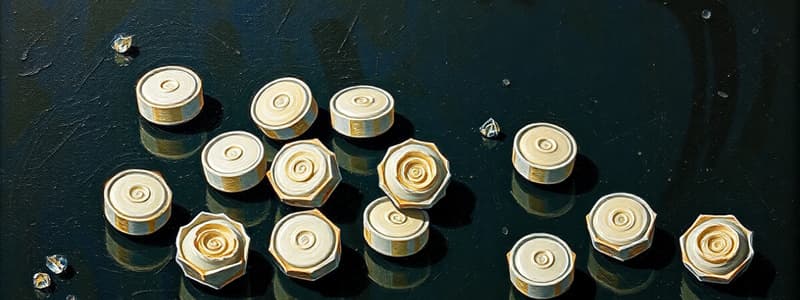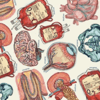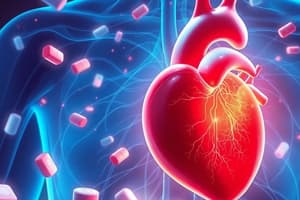Podcast
Questions and Answers
What is the primary action of nitrates in the management of angina?
What is the primary action of nitrates in the management of angina?
- Block beta-adrenergic receptors
- Dilate blood vessels to improve oxygen supply and reduce demand (correct)
- Decrease the contractility of the heart
- Increase heart rate to enhance blood flow
Which mechanism is primarily responsible for beta-blockers reducing myocardial oxygen demand?
Which mechanism is primarily responsible for beta-blockers reducing myocardial oxygen demand?
- Enhancing calcium influx in cardiac cells
- Increasing venous return to the heart
- Increasing blood vessel elasticity
- Blocking catecholamine activation of beta-adrenergic receptors (correct)
What effect do calcium channel blockers have on vascular resistance?
What effect do calcium channel blockers have on vascular resistance?
- They increase systemic vascular resistance
- They decrease systemic vascular resistance (correct)
- They selectively affect only arterial resistance
- They have no effect on vascular resistance
Which of the following is NOT a mechanism of action attributed to beta-blockers?
Which of the following is NOT a mechanism of action attributed to beta-blockers?
What is one of the primary benefits of using nitrates during angina episodes?
What is one of the primary benefits of using nitrates during angina episodes?
Calcium channel blockers differ from beta-blockers primarily in which function?
Calcium channel blockers differ from beta-blockers primarily in which function?
Which of the following statements is true regarding the use of beta-blockers in angina management?
Which of the following statements is true regarding the use of beta-blockers in angina management?
What is the effect of nitrates on the coronary arteries at higher doses?
What is the effect of nitrates on the coronary arteries at higher doses?
What is the primary use of diuretics in heart failure management?
What is the primary use of diuretics in heart failure management?
What is the mechanism of action of hydralazine?
What is the mechanism of action of hydralazine?
Which combination of medications has been shown to improve survival in patients with heart failure and reduced ejection fraction (HFrEF)?
Which combination of medications has been shown to improve survival in patients with heart failure and reduced ejection fraction (HFrEF)?
How do SGLT2 inhibitors provide cardioprotective effects?
How do SGLT2 inhibitors provide cardioprotective effects?
What condition is ivabradine primarily indicated for?
What condition is ivabradine primarily indicated for?
What effect does digoxin have on heart contractions?
What effect does digoxin have on heart contractions?
Ivabradine works by inhibiting which current in the sinoatrial node?
Ivabradine works by inhibiting which current in the sinoatrial node?
Which medication does NOT improve survival in heart failure patients?
Which medication does NOT improve survival in heart failure patients?
What is the primary mechanism by which Ranolazine alleviates angina?
What is the primary mechanism by which Ranolazine alleviates angina?
How does Ivabradine help in the management of angina?
How does Ivabradine help in the management of angina?
What is a main effect of antiplatelet drugs like Aspirin on angina?
What is a main effect of antiplatelet drugs like Aspirin on angina?
Which of the following statements about ACE Inhibitors is true?
Which of the following statements about ACE Inhibitors is true?
How do Angiotensin II Receptor Blockers (ARBs) primarily differ from ACE inhibitors?
How do Angiotensin II Receptor Blockers (ARBs) primarily differ from ACE inhibitors?
What role do beta-blockers play in heart failure management?
What role do beta-blockers play in heart failure management?
What is the mechanism of action of aldosterone antagonists in heart failure treatment?
What is the mechanism of action of aldosterone antagonists in heart failure treatment?
Which type of diuretic is primarily used to manage fluid overload in heart failure?
Which type of diuretic is primarily used to manage fluid overload in heart failure?
What effect do antianginal medications like Ranolazine and Ivabradine have on heart rate?
What effect do antianginal medications like Ranolazine and Ivabradine have on heart rate?
Which medication class is particularly important in managing systolic heart failure?
Which medication class is particularly important in managing systolic heart failure?
What common side effect is associated with ACE inhibitors that is not seen with ARBs?
What common side effect is associated with ACE inhibitors that is not seen with ARBs?
What is the primary therapeutic goal of antiplatelet drugs in angina management?
What is the primary therapeutic goal of antiplatelet drugs in angina management?
Which of the following is NOT a mechanism through which diuretics work?
Which of the following is NOT a mechanism through which diuretics work?
Flashcards
Angina
Angina
Chest pain caused by reduced blood flow to the heart muscle, making it work harder.
Antianginal Medications
Antianginal Medications
Medications used to manage angina by improving the balance between how much oxygen the heart needs and how much it gets.
Nitrates
Nitrates
Vasodilators that relax blood vessels, mainly in the veins, reducing the amount of blood returning to the heart and lowering oxygen demand.
Nitric Oxide (NO)
Nitric Oxide (NO)
Signup and view all the flashcards
Beta-Blockers
Beta-Blockers
Signup and view all the flashcards
Calcium Channel Blockers
Calcium Channel Blockers
Signup and view all the flashcards
Dihydropyridines
Dihydropyridines
Signup and view all the flashcards
Non-Dihydropyridines
Non-Dihydropyridines
Signup and view all the flashcards
Diuretics in Heart Failure
Diuretics in Heart Failure
Signup and view all the flashcards
Hydralazine and Nitrates
Hydralazine and Nitrates
Signup and view all the flashcards
SGLT2 Inhibitors - How do they work?
SGLT2 Inhibitors - How do they work?
Signup and view all the flashcards
What do SGLT2 Inhibitors do for heart failure?
What do SGLT2 Inhibitors do for heart failure?
Signup and view all the flashcards
Ivabradine - How does it work?
Ivabradine - How does it work?
Signup and view all the flashcards
Ivabradine - Who benefits?
Ivabradine - Who benefits?
Signup and view all the flashcards
Digoxin - What does it do?
Digoxin - What does it do?
Signup and view all the flashcards
Digoxin - When is it used?
Digoxin - When is it used?
Signup and view all the flashcards
Ranolazine's Action
Ranolazine's Action
Signup and view all the flashcards
Ivabradine's Target
Ivabradine's Target
Signup and view all the flashcards
How Antiplatelets Help
How Antiplatelets Help
Signup and view all the flashcards
Heparin's Role
Heparin's Role
Signup and view all the flashcards
What is Heart Failure?
What is Heart Failure?
Signup and view all the flashcards
ACE Inhibitors' Mechanism
ACE Inhibitors' Mechanism
Signup and view all the flashcards
ARBs' Action
ARBs' Action
Signup and view all the flashcards
Beta-Blockers and Heart Rate
Beta-Blockers and Heart Rate
Signup and view all the flashcards
Aldosterone Antagonists' Goal
Aldosterone Antagonists' Goal
Signup and view all the flashcards
Diuretics and Fluid Control
Diuretics and Fluid Control
Signup and view all the flashcards
How ACE Inhibitors Improve Heart Function
How ACE Inhibitors Improve Heart Function
Signup and view all the flashcards
ARBs vs. ACE Inhibitors
ARBs vs. ACE Inhibitors
Signup and view all the flashcards
Beta-Blockers' Long-Term Benefits
Beta-Blockers' Long-Term Benefits
Signup and view all the flashcards
Aldosterone Antagonists and Scarring
Aldosterone Antagonists and Scarring
Signup and view all the flashcards
Study Notes
Antianginal Medications
-
Nitrates (e.g., Nitroglycerin, Isosorbide dinitrate): Vasodilators primarily affecting veins, reducing venous return (preload) and lowering heart oxygen demand. Higher doses dilate coronary arteries, improving oxygen supply. Relieve angina by decreasing preload and afterload.
-
Beta-Blockers (e.g., Metoprolol, Atenolol, Propranolol): Block beta-adrenergic receptors, reducing heart rate, contractility, and blood pressure. Lower heart oxygen demand, improving diastolic filling, and reducing ischemia. Reduce frequency and severity of angina attacks.
-
Calcium Channel Blockers (e.g., Amlodipine, Verapamil, Diltiazem): Block calcium influx, dilating blood vessels, and lowering afterload and preload. Improve oxygen supply to ischemic heart tissue. Non-dihydropyridines also slow heart rate, further reducing oxygen consumption.
-
Ranolazine: Inhibits the late phase of sodium current, reducing intracellular calcium overload, and thus myocardial oxygen demand. Does not significantly affect heart rate or blood pressure. Improves angina control, particularly in patients not adequately controlled on other medications.
-
Ivabradine: Selectively inhibits the If channels in the SA node, slowing heart rate without affecting contractility. Improves coronary perfusion and reduces angina via lower oxygen demand.
Antiplatelet and Anticoagulant Drugs
- Aspirin, Clopidogrel, Heparin: Indirectly affect angina by reducing thrombus formation in coronary arteries. Prevent worsening of ischemia and heart attacks.
Heart Failure Drugs
-
Angiotensin-Converting Enzyme Inhibitors (ACE Inhibitors) (e.g., Enalapril, Lisinopril, Ramipril): Block ACE, reducing angiotensin II, causing vasodilation, reduced aldosterone, and lower blood pressure. Reduce afterload and preload, decreasing heart workload. Increase bradykinin, promoting vasodilation. Improve symptoms, reduce hospitalizations, and reduce mortality, especially in patients with reduced ejection fraction (HFrEF).
-
Angiotensin II Receptor Blockers (ARBs) (e.g., Losartan, Valsartan, Candesartan): Block angiotensin II receptors, causing vasodilation, reduced aldosterone, and lower blood pressure. Alternative to ACE inhibitors in cases of intolerance. Reduce hospitalizations and mortality in HFrEF.
-
Beta-Blockers (e.g., Metoprolol, Carvedilol, Bisoprolol): Block beta-adrenergic receptors, reducing heart rate, contractility, and blood pressure. Improve cardiac function, reverse heart remodeling, and increase survival. Improve symptoms, reduce hospitalizations, and reduce mortality in HFrEF, crucial for systolic heart failure management.
-
Aldosterone Antagonists (e.g., Spironolactone, Eplerenone): Block aldosterone, reducing fluid retention, lowering blood pressure, and preventing myocardial fibrosis. Improve survival and reduce hospitalizations, particularly in severe heart failure and after heart attacks.
-
Diuretics (e.g., Furosemide, Bumetanide, Torsemide, Hydrochlorothiazide, Chlorthalidone): Promote sodium and water excretion. Reduce fluid overload, lower blood pressure, and improve quality of life by relieving symptoms. Do not directly affect mortality.
-
Hydralazine and Nitrates (Vasodilators): Hydralazine directly dilates arteries, nitrates dilate veins, reducing both preload and afterload. Improve myocardial perfusion and decrease heart workload. Shown to improve symptoms, reduce hospitalizations, and improve survival, especially in African American patients.
-
Sodium-Glucose Cotransporter-2 (SGLT2) Inhibitors (e.g., Empagliflozin, Dapagliflozin, Canagliflozin): Reduce glucose reabsorption and promote glucose excretion. Cause osmotic diuresis, reducing fluid retention and blood pressure. Cardioprotective effects, reducing inflammation and fibrosis. Improve symptoms, reduce hospitalizations, and decrease mortality in HFrEF and diabetic patients.
-
Ivabradine: Slows heart rate by targeting If channels. Improves diastolic filling time and offers a way to improve oxygen delivery in patients with elevated heart rates. Reduces heart failure hospitalizations, potentially improves survival.
-
Digoxin: A cardiac glycoside increasing intracellular calcium, improving myocardial contractility. Slows heart rate. Used to improve symptoms and tolerance in heart failure, especially with atrial fibrillation. Does not improve survival but may reduce hospitalizations.
Studying That Suits You
Use AI to generate personalized quizzes and flashcards to suit your learning preferences.





